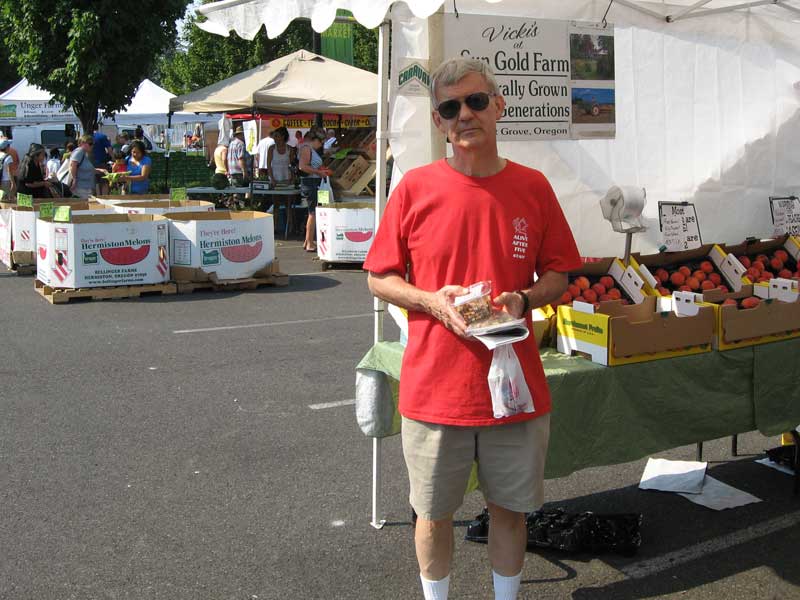LOCAVORE: a person whose diet consists only or principally of locally grown or produced food
I feel really, really blessed to live in the Willamette Valley. Our summer weather is spectacular: not too hot, not too cold. We’ve got the Pacific Ocean out West and the Cascade Mountains to the East with lush farmland in between… and some calming forests for good measure. It’s a little slice of paradise.
We’re blessed with a wealth of famer’s markets throughout the Greater Portland Metro Area. We try to get to the Beaverton Farmer’s Market every Saturday during the Summer Market (May through October) and at least monthly during the Winter Market. I love being around all the organically grown fruits and vegetables, and I honor the hard work that goes into producing them. And though we’re mostly vegan, we do partake of the grass-fed beef and pork as well as free range poultry from time to time. Fresh food really does taste better. And it’s all available right on our doorstep.
A friend joined us for our weekly Farmer’s Market visit. She noticed how much more we pay for all that food relative to the average grocer. Here’s why we do it:
- The average meal in the United States travels 1,500 miles from the farm to the plate. That effort consumes a lot of fossil fuel (of which there is a diminishing supply) and pumps a great deal of carbon dioxide into the air (which is bad for breathing and has been linked to global warming). The growers who support the Beaverton Market live and work within 100 miles of their fruit and vegetable stands.
- Because grocery store fruit and vegetables travel a substantial distance, they must be picked while unripe and then gassed to ripen during transport. It just doesn’t taste as good and may not be as nutritious. (To their credit, many of our local grocers are doing a better job sourcing produce from local growers.)
- Factory farms that generate ultra-cheap produce may engage in practices that result in resource depletion, soil erosion, water and air degradation, and food contaminants (e.g., pesticide residue). By shopping at the Farmer’s Market, we get to know the farmers and the methods they use to grow their crops. It’s better for our bodies and better for the planet.
- Farming is hard work; the advent of industrial farming has been economically brutal for the “little guy.” In 1900, 40% of the population lived on farms; today no more than 2% do. Just since 1960, the number of farms has declined from 3.2 million to ~2 million. We want to support the folks who are still committed to this work. We’re voting with our wallet!
- I like having a weekly reminder of our need for exercising stewardship of the good earth that we’ve been given. As Wendell Berry says: “Agrarian farmers know that their very existence depends on their willingness to receive gratefully, use responsibility, and hand down intact an inheritance, both natural and cultural, from the past… The land is a gift of immeasurable value… It is a gift to all the living in all time.”
Won’t you join me at the farmer’s market?
